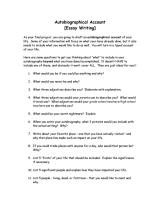What does it mean to quote from a source?
Quoting from a source involves using the exact words or phrases from that source within your own work, while clearly attributing those words to the original author or text. It's a way of incorporating someone else's ideas, research, or words into your writing to support your arguments, provide evidence, or add credibility to your work.
When you quote from a source, you are directly referencing and reproducing a specific portion of text, whether it's a sentence, a paragraph, or even just a phrase. Properly quoting involves using quotation marks (" ") around the exact words taken from the source and citing the source's author, publication, and page number (if applicable) in the appropriate citation style (such as APA, MLA, Chicago, etc.).
Quoting is important for several reasons:
Credibility and Validity: Quoting reputable sources adds credibility and validity to your own work by supporting your arguments with evidence and expert opinions.
Acknowledgment of Sources: It shows respect for the original author's ideas and work by giving them proper credit.
Avoiding Plagiarism: Properly quoting and citing sources prevents plagiarism, which is presenting someone else's work or ideas as your own without proper acknowledgment.
Supporting Arguments: Quotes can strengthen your arguments or provide evidence to back up your claims, adding depth and authority to your writing.
Context and Detail: Sometimes, paraphrasing might lose the original context or meaning of the text, so quoting directly preserves the specific language used by the author.
Overall, quoting from sources is an essential practice in academic, research, and professional writing to support your ideas, show respect for the original authors, and maintain academic integrity by properly citing the sources used in your work.
Citing Your Sources: The Backbone of Credibility
Citing sources in academic and professional writing is more than just a formality; it's the bedrock of credibility and intellectual integrity. Here's why:
1. Building Trust and Legitimacy:
- Supporting your claims: Quoting, paraphrasing, or summarizing others' ideas strengthens your arguments by showing you've researched the topic and haven't pulled your points out of thin air.
- Giving credit where it's due: Citing acknowledges the intellectual foundation of your work and avoids plagiarism, a serious academic offense.
- Demonstrating transparency: It allows readers to trace your information back to its origin, evaluate its validity, and potentially explore further on their own.
2. Enhancing Context and Understanding:
- Adding depth and nuance: By incorporating different perspectives, you enrich your discussion and avoid presenting a one-sided view.
- Providing evidence and data: Citing research findings, statistics, or expert opinions bolsters your claims and adds weight to your analysis.
- Sparking critical thinking: By engaging with diverse sources, you encourage readers to question, compare, and form their own informed opinions.
3. Fostering Collaboration and Knowledge Sharing:
- Building on existing knowledge: Citing creates a network of interconnected ideas, allowing future researchers to build upon your work and advance the field.
- Promoting intellectual discourse: It fosters a culture of open exchange and encourages healthy debate, leading to new discoveries and innovation.
- Giving voice to diverse voices: Citing marginalized or underrepresented voices ensures their contributions are acknowledged and incorporated into the broader discourse.
Ways to Incorporate Quotes:
- Direct quotes: Use quotation marks and in-text citations to faithfully reproduce someone's exact words.
- Paraphrases: Rephrase someone's ideas in your own words, citing to avoid plagiarism.
- Summaries: Briefly condense a longer source, capturing its main points and citing for context.
- Block quotes: Set off lengthy quotes visually, usually for emphasis or impactful statements.
Remember, citing effectively is not just about mechanics; it's about demonstrating intellectual honesty, fostering collaboration, and enriching your work with the voices and knowledge of others. Embrace the power of citing, and your writing will stand tall on the foundation of credibility and intellectual engagement.












